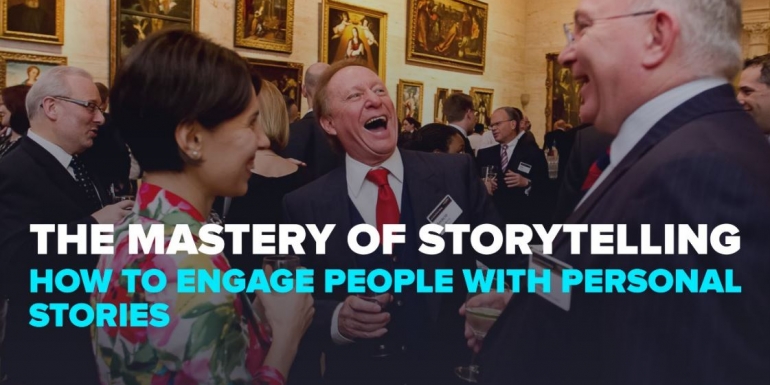How to engage people with personal stories
Why, do you think, TV shows about celebrities have such high ratings? Because someone else’s personal life is always interesting. It is an immanent characteristics of human psychology. Even if you are not a rock star, your personal life and your stories are interesting too. You can use it for efficient networking.
Sure you don’t need to tell your new friends about your fishing adventures or a visit to sauna last weekend. The stories should be related to the topic of your conversation. For introduction you may have 3 interesting stories about:
- Who you are
- What you do and why you have decided to go into it
- What you have been through and what you have achieved
For example, I often share my story about how I moved to Canada from Israel, how I learned about networking and decided to develop in this area. At that moment I was only 10. I didn’t speak English as my native language is Hebrew. I didn’t know how to start a conversation, how to learn the language, how to contact people. I couldn’t even talk to my classmates at school. Nevertheless, about 6 months later I could understand locals rather well and started making friends.
I tell this story when people ask how I survived in Canada without English or French, having to go to school. Yes, this story is not quite suitable for investors but it is welcome at unofficial events.

What are life stories for?
When you tell life stories you build trust between you and your conversation partner. It happens because you share something personal.
Besides, it is always easier to make a person interested if you share your practical experience, let him or her feel what you have gone through. When people understand that you have been through pain, joy, success and failures in your life, they don’t take you as a stranger any more but as a “people person”, and they trust you more.
One of my stories about ups and downs is connected to the situation of 5 years ago, when I was drastically short of money. Despite having several profitable businesses I was reinvesting all my profits. I managed to sneak out of the situation and even became a guest speaker at the Skolkovo Business School, and it gave me more self-confidence.
Since I have dealt with such difficulties myself, now I can consult on these issues, be a mentor and help other company owners avoid my mistakes.
Several ideas for your stories
You may have thought: “Well, I don’t have any interesting stories”. Nothing like that. You just need to answer a few questions to recollect some insightful stories:
- Where are you from? You may have some interesting motivational stories about your home town, moving to a different city or country, etc.
- What accomplishments are you proud of? How have you reached them?
- Do you have family-related stories? For example, Richard Branson, the famous entrepreneur, likes to share a story about how his parents taught him to swim and never give up.
- What before-after stories can you recall? For example, the story about Steve Jobs’s garage, the place where Apple company was created, is a vivid example of storytelling. By the way, before-after stories are always the most interesting and popular ones. Use the structure below to create them.
- How about stories about your work? You may have a non-trivial case about how you have closed an important deal or found a partner due to a happy coincidence.
Remember such stories and write them down. They may be only 2-3 minutes long. But they should be useful and help people understand you better.
To sum up, use your personal experience for your networking goals! And don’t forget to ask your acquaintances to tell their stories. They definitely have something to share with you!
Before-after story structure:
Start with the challenge: the problem that required your actions. What obstacles did you face? Were you desperate and ready to quit? Then share how you searched for the right solution, how you eventually reached success and what conclusions you drew from that story.

Conclusions: lessons that you have learned from the story
Victory: How and why you have reached success
Search: way you have decided to go
Fall: obstacles that you have encountered
Challenge: task you have faced



